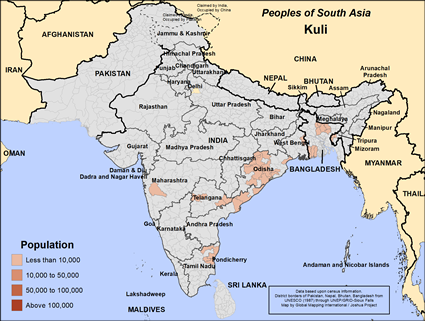Kuli in India

Photo Source:
Anonymous
|

Map Source:
People Group data: Omid. Map geography: UNESCO / GMI. Map Design: Joshua Project
|
| People Name: | Kuli |
| Country: | India |
| 10/40 Window: | Yes |
| Population: | 16,000 |
| World Population: | 16,000 |
| Primary Language: | Odia |
| Primary Religion: | Hinduism |
| Christian Adherents: | 0.23 % |
| Evangelicals: | 0.00 % |
| Scripture: | Complete Bible |
| Ministry Resources: | Yes |
| Jesus Film: | Yes |
| Audio Recordings: | Yes |
| People Cluster: | South Asia Tribal - other |
| Affinity Bloc: | South Asian Peoples |
| Progress Level: |
|
Introduction / History
The Kuli live in Odisha and are a scheduled caste. They speak, read and write in Oriya, the language of Odisha.
What Are Their Lives Like?
The Kuli are landowners. Their main work is weaving and farming. They have a traditional and regional council to look after their interests. They love music and dance. They are usually monogamous. Divorce is allowed if the community agrees to it. Though they are Hindus they bury their dead. Sons inherit the family property when the father dies. The oldest son gets the most in the inheritance and he takes charge as family head.
What Are Their Beliefs?
The Kuli people practice Hinduism, the ancient religion of India. Hinduism is a catch-all phrase for the local religions of South Asia, so it is very diverse. At the popular level, Hindus worship and serve the gods of the Hindu pantheon. They visit Hindu temples and offer prayers, food, flowers, and incense to their gods in hopes of gaining protection and benefits. They do not have a personal or familial relationship with their gods like Christians or Jews. There are other Hindus who are much more philosophical, especially among the Brahmins.
What Are Their Needs?
The Kuli people need to experience the abundant blessings of Jesus Christ.
Prayer Points
Pray that Indian believers will lead them into a movement to Jesus Christ. Pray that the council leaders will open the doors for their people to accept salvation in Christ alone. Pray for spiritual hunger that will lead them to the empty grave. Pray for intercessors and workers.